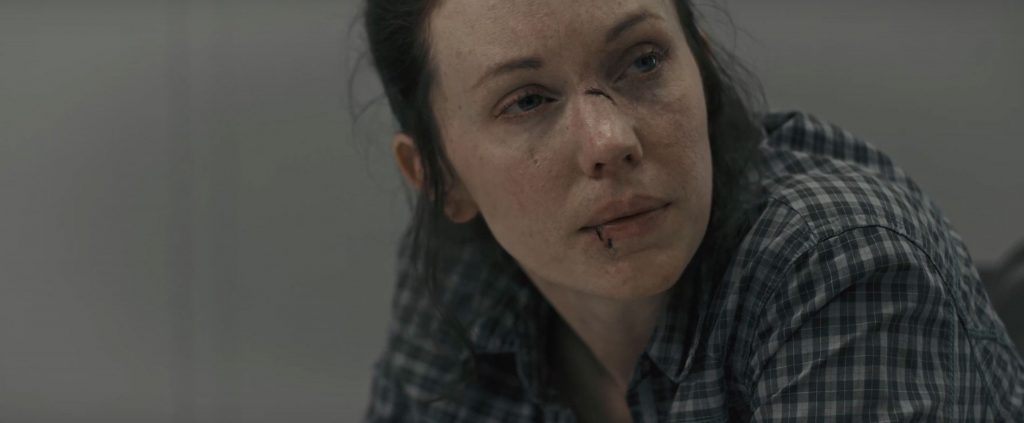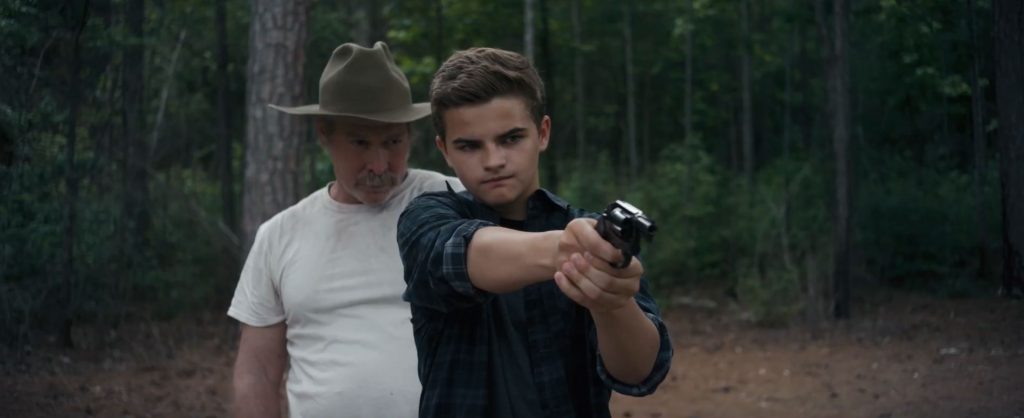Bethany Anne Lind, Blood on Her Name, drama, Elisabeth Rohm, Jared Ivers, movies, reviews, Reynoso Dias, Tony Vaughn, Will Patton
February 28, 2020
by Carla Hay

Directed by Matthew Pope
Culture Representation: Taking place in an unnamed small U.S. town, this crime thriller has a predominantly white cast of characters (with some Latino and African Americans in supporting roles) that represent the working-class and middle-class.
Culture Clash: A divorced mother who has killed a man tries to cover up the crime.
Culture Audience: “Blood on her Name” will appeal primarily to people who like tension-filled crime stories about ordinary people caught up in terrible circumstances.

“Blood on Her Name” sounds like it might be the title of a horror film, but the story is really a crime thriller about choices that a desperate woman makes that will have long-lasting effects on her family. It’s suspenseful from beginning to end, and it will make viewers wonder what they would do if they were in the same situation.
In the beginning of the story, auto-body shop owner Leigh Tiller (played by Bethany Anne Lind) is bruised and battered from an obvious physical fight. But that’s not the worst of her problems. The man who caused her injuries is now dead, and Leigh is desperately trying to figure out where she should dump his body and get rid of the weapon (a mechanic’s wrench) that she used to kill him. The movie never shows the fight, even in flashbacks, so viewers will have to speculate about what took place during this fatal altercation.
With the body wrapped in tarp, Leigh takes the corpse with her in a canoe out to a lake, where she throws the wrench into the water. The movie’s only real plot hole is that it doesn’t explain how Leigh, who is of average height and weight, could carry a dead body of that size by herself and load it in her car and then a canoe. Adrenaline has been proven to give people extraordinary strength, so that will have to be the only logical explanation.
As Leigh is about the throw the body into the lake too, the dead man’s cell phone rings. She lets it go to voice mail and then listens to the message. It’s the dead man’s son, who sounds concerned that he hadn’t come home the night before. In that moment, she decides not to dispose of the body in the lake, and she puts the body back in the trunk of her car.
Leigh is obviously in a major panic and isn’t thinking straight. Not only does she seem unsure of what to do with the body, she’s also taken no precautions to prevent her DNA or fingerprints from being on the body or the tarp used to cover it. The other less-than-smart thing that she does is keep the dead man’s cell phone. Apparently, she doesn’t know that police can track a cell phone’s location and travel route by the nearest cell phone towers that pick up the cell phone’s signal.
The next day, Leigh is in the car with her delinquent teenage son Ryan (played by Jared Ivers), as they drive to a meeting with Ryan’s parole officer. It isn’t specifically said what Ryan did that got him arrested, but it was bad enough where he ended up in jail, Leigh has to pay restitution, and Ryan has to do drug testing by urine sample.
While in the car, Leigh tells Ryan not to worry about the man who came to their home last night because he left right after Ryan left. From the expression on Ryan’s face, he’s somewhat skeptical, but he doesn’t press the matter. When Ryan and Leigh meet with parole officer Nathan Parrish (played by Tony Vaughn), the officer asks what happened to Leigh’s face, and she lies and tells him that she got injured on the job.
And where is Ryan’s father? He’s divorced from Leigh and is in prison for dirty deals involving stolen cars. It’s implied in the movie, but not said outright, that he used the auto-body shop to sell parts from these stolen automobiles. While he’s in prison, Leigh has taken over the shop, which is so small that only two people work there: Leigh and her loyal mechanic Jimmy Gonzales (played by Reynoso Dias), who immediately asks what happened to Leigh when she goes to work and he sees the injuries on her face.
Leigh tells Jimmy that that a junkie broke into the shop when she was alone, and she fought him off. When he tells her that she should report the break-in and assault to the police, Leigh says she won’t, because she doesn’t want the shop to have “a bad reputation with the few customers we have left.” When she’s alone, Leigh checks the computer surveillance video from the previous night and deletes what appears to be damning evidence.
And then Leigh does something strange: She goes back to the body to retrieve the dead man’s wallet, she takes out the driver’s license to get his address, and then drives to the address that’s on the license. She parks a little way down the street so she can get a good look at what’s going on at the address.
While parked in her car, she sees on the dead man’s cell phone that he’s been getting increasingly angry text messages from a woman who’s the mother of the son who left the voice mail from the previous night. The profile picture on the text messages shows what the woman looks like, and the same woman is sitting out front in the trailer. Her son, who appears to be in her late teens, is seen outside of the trailer too. The woman’s name is Dani Wilson (played by Elisabeth Röhm), and her son’s name is Travis (played by Jack Andrews).
While Leigh is spying on the dead man’s family, Leigh is startled by a cop, who asks why she’s parked there in the middle of the day. And the cop happens to be Leigh’s widowed father Richard (played by Will Patton), who’s on patrol duty. Even though this story takes place in an unnamed U.S. city, it’s obviously a small town because Richard doesn’t have a cop partner when he’s on patrol. And as the story unfolds with Leigh trying to cover up what she did, it’s even more obvious that the city where she lives has a very small police force.
Why was Leigh parked in front of the dead man’s home? We find out that it’s because she wanted to see where she could return the body to his family without being caught. She goes back to the home at night to dispose of the body in the family’s shed. She then leaves a hand-written note in the family’s mailbox that says, “He’s in the shed. I’m sorry.”
Even though it would have been easier to get away with what she did if the body was never found, one can only speculate that she wanted the body to be found because she felt guilty and wanted to give closure to the dead man’s family. In a weird way, she’s thinking that it’s more “respectful” to leave the body at the dead man’s home instead of leaving the body at a random place where a stranger would find it.
But how much will this decision cost Leigh in the end? And who exactly was the dead man? Those questions are answered in the movie. But there are some twists and turns along the way, including Leigh noticing that her unusual necklace (a tiny wrench on a chain) is missing, and she might have dropped it when she left the body in the shed.
“Blood on Her Name” (ably directed by Matthew Pope, who wrote the screenplay with Don M. Thompson) maintains a panic-stricken tone throughout the film. If some of Leigh’s decisions might seem illogical, consider that this is probably the first time she’s killed someone, and the death doesn’t appear to have been planned in advance. And then factor in that her father is a cop who would be investigating the disappearance/death of this man, and it’s easy to see why her thought process would be scrambled by extreme fear and guilt.
During different scenes in the movie, Leigh starts to have flashback visions of herself as a child of about 8 or 9 years old. It’s here that we see that she used to idolize her father at that age, and she admired his job as a cop so much that she would ride in the back of his police car. But she now has a strained relationship with her father, no doubt because she was married to a man who’s now in prison. In case it wasn’t clear from her actions, Leigh’s nickname could be “Bad Life Choices.”
“Blood on Her Name” is not a groundbreaking film, but it’s a taut thriller with solid acting and a few unpredictable revelations that add depth to the movie. The morality dilemmas in the story aren’t just about what someone would do to cover up a crime but also what someone would do to protect a family.
Vertical Entertainment released “Blood on Her Name” in select U.S. cinemas, on digital and on VOD on February 28, 2020.
